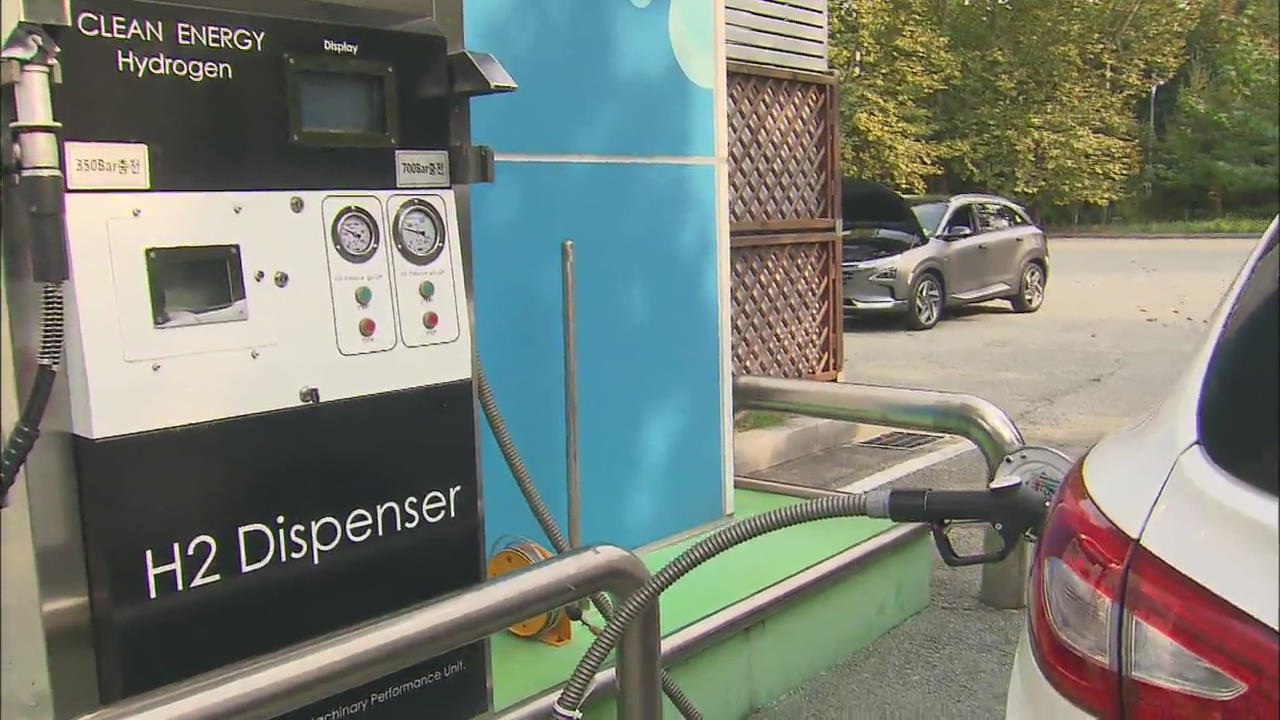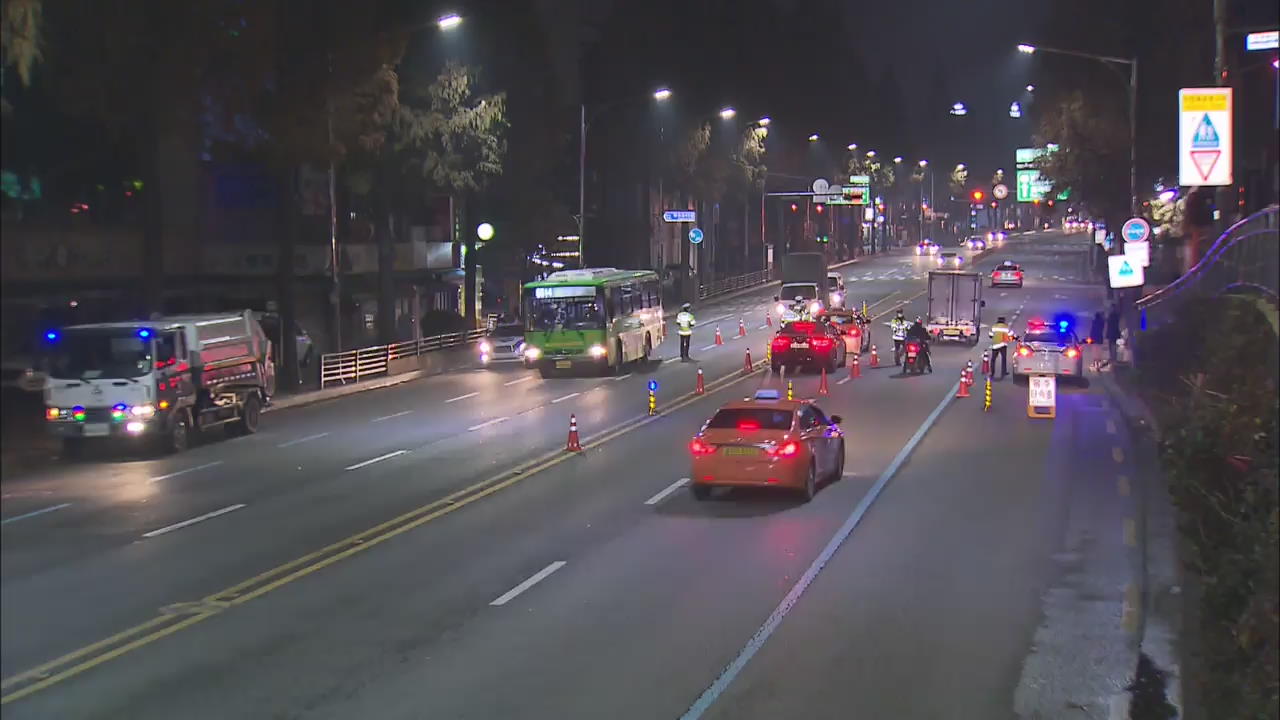Hydrogen Vehicles
입력 2018.10.22 (15:06)
수정 2018.10.22 (15:26)
읽어주기 기능은 크롬기반의
브라우저에서만 사용하실 수 있습니다.
[Anchor Lead]
Korea was able to mass produce hydrogen vehicles five year ago for the first time in the world. But today fewer than 500 hydrogen vehicles are on the road nationwide. Here's the reason why these eco-friendly vehicles are not widely driven in Korea.
[Pkg]
At this hydrogen recharging station in downtown Paris... A taxi driver skillfully recharges his Korean-made hydrogen cab with hydrogen fuel. There are currently sixty-two Korean-made hydrogen taxis on the road in Paris. However, such hydrogen self-recharging, now quite common in Paris, is actually illegal in Korea. The current Korean law dictates that a licensed safety supervisor must be present at a hydrogen recharging station and that in putting hydrogen must be done by an employee. Also, a hydrogen recharging station must be farther out than 200 meters from schools and cannot be opened in residential or commercial areas. Groundless bias against hydrogen vehicles that they are prone to explosion is also hindering the distribution of these eco-friendly cars. The fact is that hydrogen, being lighter than air, is safer than gasoline if leaked. Unlike LPG vehicles, hydrogen vehicles are not run on combust fuel, but on electricity made by combining hydrogen and oxygen. They're closer to electric cars in the way their motors are operated. The government has announced that 15,000 hydrogen vehicles will be sold and 300 recharging stations built by 2022, but the plan may not work without modifying related regulations and improving people's perceptions.
[Soundbite] Prof. Kim Pil-soo(Dept. of Automotive Engineering, Daelim Univ. College) : "Korea's hydrogen car manufacturing technology is world-class now, but it's very likely to benefit only others if there aren't more recharging stations or hydrogen vehicles in the country."
The lack of recharging stations cause poor sales of hydrogen cars, which discourages recharging stations from being built. Because of such a vicious cycle, currently there are fewer than 500 hydrogen vehicles on the road in Korea.
Korea was able to mass produce hydrogen vehicles five year ago for the first time in the world. But today fewer than 500 hydrogen vehicles are on the road nationwide. Here's the reason why these eco-friendly vehicles are not widely driven in Korea.
[Pkg]
At this hydrogen recharging station in downtown Paris... A taxi driver skillfully recharges his Korean-made hydrogen cab with hydrogen fuel. There are currently sixty-two Korean-made hydrogen taxis on the road in Paris. However, such hydrogen self-recharging, now quite common in Paris, is actually illegal in Korea. The current Korean law dictates that a licensed safety supervisor must be present at a hydrogen recharging station and that in putting hydrogen must be done by an employee. Also, a hydrogen recharging station must be farther out than 200 meters from schools and cannot be opened in residential or commercial areas. Groundless bias against hydrogen vehicles that they are prone to explosion is also hindering the distribution of these eco-friendly cars. The fact is that hydrogen, being lighter than air, is safer than gasoline if leaked. Unlike LPG vehicles, hydrogen vehicles are not run on combust fuel, but on electricity made by combining hydrogen and oxygen. They're closer to electric cars in the way their motors are operated. The government has announced that 15,000 hydrogen vehicles will be sold and 300 recharging stations built by 2022, but the plan may not work without modifying related regulations and improving people's perceptions.
[Soundbite] Prof. Kim Pil-soo(Dept. of Automotive Engineering, Daelim Univ. College) : "Korea's hydrogen car manufacturing technology is world-class now, but it's very likely to benefit only others if there aren't more recharging stations or hydrogen vehicles in the country."
The lack of recharging stations cause poor sales of hydrogen cars, which discourages recharging stations from being built. Because of such a vicious cycle, currently there are fewer than 500 hydrogen vehicles on the road in Korea.
■ 제보하기
▷ 카카오톡 : 'KBS제보' 검색, 채널 추가
▷ 전화 : 02-781-1234, 4444
▷ 이메일 : kbs1234@kbs.co.kr
▷ 유튜브, 네이버, 카카오에서도 KBS뉴스를 구독해주세요!
- Hydrogen Vehicles
-
- 입력 2018-10-22 15:17:51
- 수정2018-10-22 15:26:43

[Anchor Lead]
Korea was able to mass produce hydrogen vehicles five year ago for the first time in the world. But today fewer than 500 hydrogen vehicles are on the road nationwide. Here's the reason why these eco-friendly vehicles are not widely driven in Korea.
[Pkg]
At this hydrogen recharging station in downtown Paris... A taxi driver skillfully recharges his Korean-made hydrogen cab with hydrogen fuel. There are currently sixty-two Korean-made hydrogen taxis on the road in Paris. However, such hydrogen self-recharging, now quite common in Paris, is actually illegal in Korea. The current Korean law dictates that a licensed safety supervisor must be present at a hydrogen recharging station and that in putting hydrogen must be done by an employee. Also, a hydrogen recharging station must be farther out than 200 meters from schools and cannot be opened in residential or commercial areas. Groundless bias against hydrogen vehicles that they are prone to explosion is also hindering the distribution of these eco-friendly cars. The fact is that hydrogen, being lighter than air, is safer than gasoline if leaked. Unlike LPG vehicles, hydrogen vehicles are not run on combust fuel, but on electricity made by combining hydrogen and oxygen. They're closer to electric cars in the way their motors are operated. The government has announced that 15,000 hydrogen vehicles will be sold and 300 recharging stations built by 2022, but the plan may not work without modifying related regulations and improving people's perceptions.
[Soundbite] Prof. Kim Pil-soo(Dept. of Automotive Engineering, Daelim Univ. College) : "Korea's hydrogen car manufacturing technology is world-class now, but it's very likely to benefit only others if there aren't more recharging stations or hydrogen vehicles in the country."
The lack of recharging stations cause poor sales of hydrogen cars, which discourages recharging stations from being built. Because of such a vicious cycle, currently there are fewer than 500 hydrogen vehicles on the road in Korea.
Korea was able to mass produce hydrogen vehicles five year ago for the first time in the world. But today fewer than 500 hydrogen vehicles are on the road nationwide. Here's the reason why these eco-friendly vehicles are not widely driven in Korea.
[Pkg]
At this hydrogen recharging station in downtown Paris... A taxi driver skillfully recharges his Korean-made hydrogen cab with hydrogen fuel. There are currently sixty-two Korean-made hydrogen taxis on the road in Paris. However, such hydrogen self-recharging, now quite common in Paris, is actually illegal in Korea. The current Korean law dictates that a licensed safety supervisor must be present at a hydrogen recharging station and that in putting hydrogen must be done by an employee. Also, a hydrogen recharging station must be farther out than 200 meters from schools and cannot be opened in residential or commercial areas. Groundless bias against hydrogen vehicles that they are prone to explosion is also hindering the distribution of these eco-friendly cars. The fact is that hydrogen, being lighter than air, is safer than gasoline if leaked. Unlike LPG vehicles, hydrogen vehicles are not run on combust fuel, but on electricity made by combining hydrogen and oxygen. They're closer to electric cars in the way their motors are operated. The government has announced that 15,000 hydrogen vehicles will be sold and 300 recharging stations built by 2022, but the plan may not work without modifying related regulations and improving people's perceptions.
[Soundbite] Prof. Kim Pil-soo(Dept. of Automotive Engineering, Daelim Univ. College) : "Korea's hydrogen car manufacturing technology is world-class now, but it's very likely to benefit only others if there aren't more recharging stations or hydrogen vehicles in the country."
The lack of recharging stations cause poor sales of hydrogen cars, which discourages recharging stations from being built. Because of such a vicious cycle, currently there are fewer than 500 hydrogen vehicles on the road in Korea.
이 기사가 좋으셨다면
-
좋아요
0
-
응원해요
0
-
후속 원해요
0

















이 기사에 대한 의견을 남겨주세요.